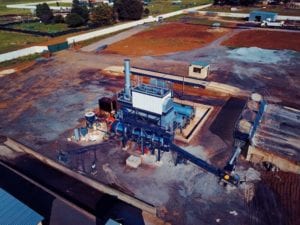 Cost-effective, mechanised solutions for building and maintaining South Africa’s road network are a priority, but budgets are constrained and project margins are becoming leaner. This makes equipment selection an overriding consideration, especially for SMME contractors, and Apollo’s solutions make real business sense here.
Cost-effective, mechanised solutions for building and maintaining South Africa’s road network are a priority, but budgets are constrained and project margins are becoming leaner. This makes equipment selection an overriding consideration, especially for SMME contractors, and Apollo’s solutions make real business sense here.
Plant introductions
To test the local market, Ammann began introducing selected Apollo asphalt plant and paving models during Q4 2016, with a specific focus on the SMME road contractor segment. Another focus group going forward is public entities, such as roads departments, which are embarking on gravel-to-tar upgrades, as well as ongoing urban and municipal resurfacing projects. Market acceptance has been excellent and Lehman says the line-up was subsequently extended during 2017 to include wet-mix concrete plants. Now preparations are under way to launch further models in 2018. These include Apollo asphalt and soil compaction units from the AV double-drum range, and selected single-drum machines, like the ASC 122. As with all Apollo products, every unit that comes off the production line is infused with Ammann’s DNA.Global footprint, local knowledge
Ammann is now represented by a comprehensive network of around 160 dealers and more than 30 agents in100-plus countries. Including the Apollo facility in Ahmedabad, India, Ammann currently has nine manufacturing centres spread across seven countries, namely Switzerland, Germany, Italy, the Czech Republic, China and Brazil, and its R&D investment has certainly paid dividends. Today, for example, Ammann is one of the world’s largest manufacturers of pavers. Apollo, in turn, is the dominant paver OEM in India. Currently, the estimated Apollo machine population for mechanical and sensor pavers is 7 575 and 2 202, respectively. In 2016, Apollo India sold approximately 600 pavers. That underscores strong uptake and confidence in the brand. To build current and future capacity, Ammann recently invested approximately €85 million in a major expansion at Apollo’s Ahmedabad factory. Key products manufactured there include Apollo-branded asphalt mixing plants, wet-mix plants, asphalt pavers and compactors.
Asphalt plant range
Apollo manufactures continuous and batch plants for the asphalt sector in a range of sizes, to suit product and output requirements.The first plants to debut in South Africa were the Apollo ValueTec 80 and CounterFlow 90 units following their international unveiling at Bauma Conexpo India in December 2016. With capacities of 80 t and 90 t per hour, respectively, these units combine the simplicity of continuous and batch drum-mix plants with exceptional fuel efficiency, thanks to counterflow technology. These plants can also be set up for reclaimed asphalt (RA).
ValueTec and DrumMix
The Apollo ValueTec 80 and the Apollo CounterFlow 90 mixing plants are the first plants to be launched in 2017. Both are 15% RA compliant and can be modified for higher RA output requirements. These units have maximum tonnage outputs of 80 t and 90 t per hour, respectively. Larger models will be available. In the ValueTec series, this extends up to 240 t, and 120 t for the DrumMix series. The ValueTec meets the requirements for cold or hot reclaimed asphalt feeds, together with either liquid or solid additives. This is one of the smallest Apollo plants and is well suited to business owners who want straightforward processes and the ability to further customise with options. This plant ranges from very basic functionality to much more advanced applications, depending on the needs ofthe contractor. There are currently Apollo asphalt plants installed within Gauteng and Mpumalanga. These units have been acquired by emerging asphalt contractors.
Paving and compaction
On the machine front, Apollo’s extensive range includes heavy tandem rollers, pavers (hydrostatic or mechanical), kerb laying machines, bitumen pressure distributors and brooms. Within the South African market, the AP 600 hydrostatic paver has been well received by local contractors following its availability in May 2017. This machine is equipped with the TV 4900 screed, which features high-traction wheel drive, accurate grade and slope control, and long component life. The screed is extendable from 2.55 m to 4.9 m and up to 6.5 m with mechanical extensions. Lehman adds, “Preparations are now being made to phase in the full Apollo line-up and we plan to feature key new models at our Techno Day in April 2018. “Alongside asphalt solutions, we plan to unveil Apollo’s latest WetMix concrete plant innovations, which, together with the full range, are now available on order, but will soon be part of our in-country stockholding,”he concludes.




